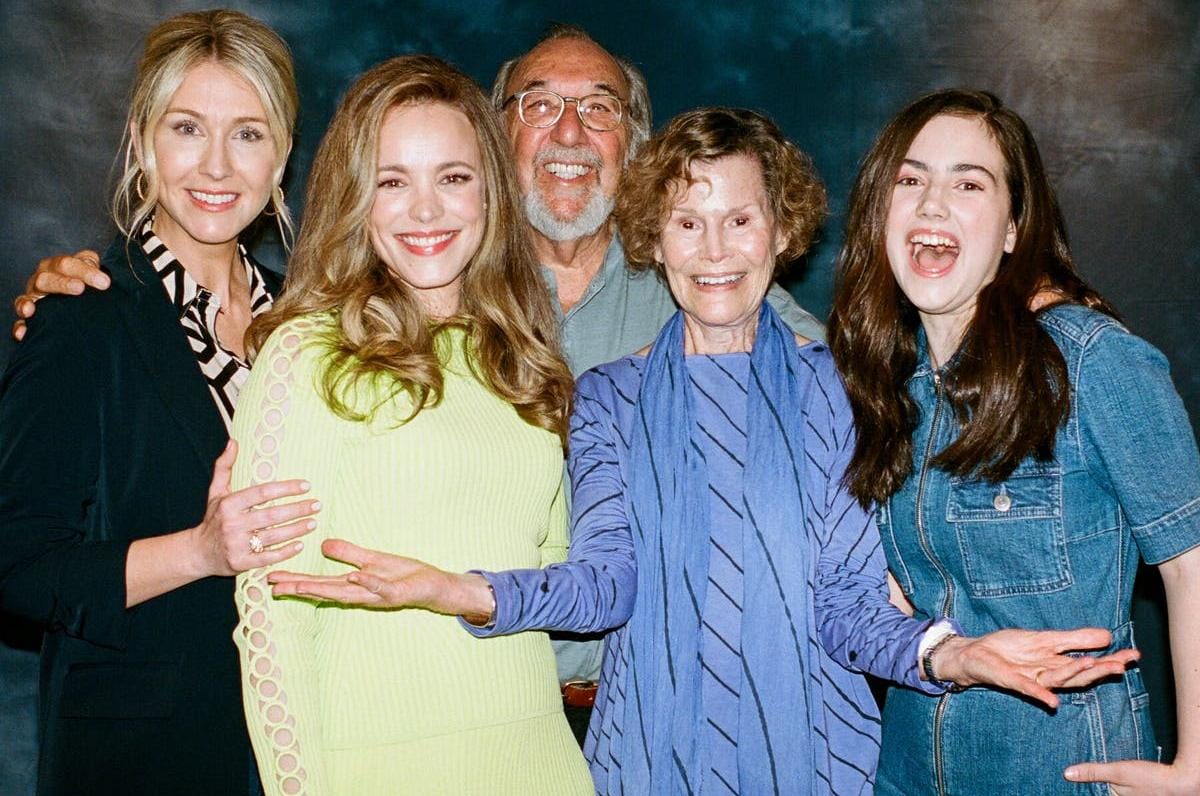Judy Blume’s 1970 novel hits the big screen at a difficult political moment for a story with themes of bodily autonomy and religious choice.
There is a moment that has happened millions of times for eons, and yet has rarely been captured on film: a 12-year-old girl wondering what to do when she gets her period.
Judy Blume described it in print, in her seminal 1970 novel, “Are You There God? It’s Me, Margaret.” More than a half-century later, the movie adaptation, due April 28, is putting that awkward puzzling-through onscreen, as young Margaret practices inserting a pad in her underwear. It’s a scene that is so quietly revolutionary, it made the movie’s editor cry when she first saw the footage.
There was just this sense, said the movie’s writer-director, Kelly Fremon Craig: “Oh my gosh, we have never been allowed to show this.”
Filming it “felt like some sort of release of the shame and embarrassment around it.”
Menstruation, burgeoning sexuality and fraught gender dynamics, religion, the barefoot-in-the-sprinkler joys and gossip-twisted tribulations of girlhood: “Are You There God? It’s Me, Margaret” tracks it all, and has been both banned and beloved for it.
In the popular imagination, the book is mostly concerned with the changing body and the rites of puberty, and that’s what made it controversial. But Margaret’s exploration of religion — her Jewish father and Christian mother encourage her to decide for herself — also drew the ire of the religious right. The God Margaret confides in is nondenominational; as a preteen, she has agency and choice.
This 53-year-old story is landing in theaters squarely in the middle of today’s culture wars. The weightier issues it reflects, which had seemingly receded, are back at the forefront: overt antisemitism, the widespread curtailing of women’s reproductive rights, and a resurgence of book banning and censorship. “It’s worse than the ’80s,” when the author’s work was first targeted, “because of the way it’s coming from government,” Judy Blume said.
An era in which girls and women were held in an information vacuum — about their own bodies! — seems dangerously close to being resurrected. Even as children are starting puberty earlier, legislation currently advancing in the Republican-controlled House in Florida would effectively ban girls from even discussing their periods, according to the bill’s sponsor, until middle school. (The bill also limits sex education in general.)
“I’m worried,” Blume said, “that if we’re just complacent and laugh about it — like, that’s ridiculous, you can’t stop young girls from standing around in elementary school talking about periods. And it is laughable, and it would be great if it was just a joke. But it’s not.”
Blume, 85, has been active with the National Coalition Against Censorship for decades. Recently she felt ready to step back. “Now I feel I’m going to speak out every chance I get,” she told me.
WE WERE TALKING seaside in Key West, where Blume and her husband, George Cooper, run an independent nonprofit bookstore housed with a gallery space; Cooper, a retired law professor, also founded an indie movie theater. As a couple, they are a major cultural hub.
The theater held a benefit screening of “Margaret” that drew far-flung Blume fans like the radio personality Charlamagne tha God; lots of colorfully dressed locals; and a front row full of tween girls eager to meet Rachel McAdams, who plays Margaret’s mother. By the end of the night, they were clustering around Blume, said her friend Meg Cabot, the best-selling author of “The Princess Diaries.”
The movie, which stars Abby Ryder Fortson (“Transparent,” “Ant-Man”) as Margaret and Kathy Bates as her doting Manhattan glamma, is sweetly faithful to its source, down to the station wagons, wood-paneled basement mixers and coy names for feminine products.
Though the filmmakers may hope for multigenerational crowds, the film is not exactly for children. It’s for their parents, the Gen Xers and older millennials who grew up with Margaret — “the nostalgia audience,” Blume said.
Partly for their sake, Margaret’s mother got a new, expanded story line. “Of any project I’ve ever done, when I mention this one to people, they just light up,” McAdams told me in Key West. “They are so ready and excited to share their Judy Blume stories and connections, and how ‘Margaret’ just changed them, and how grateful they are for it.”
“Judy Blume books, you remember where you were when you read them and the feelings you had,” she added. “They’re just something that sticks with you.”
Treating taboo topics matter-of-factly, with emotional candor, is, of course, what has animated both Blume’s public profile and her writing for children and young adults — a whole generation-spanning oeuvre, with more than 90 million books sold worldwide and a phalanx of devoted (and high-profile) fans who tend to get weepy when they meet her.
Hollywood courted her regularly, but she was protective of her material, and it took a lesser known filmmaker, Fremon Craig, and her Oscar- and Emmy-winning mentor, James L. Brooks (“Broadcast News,” “The Simpsons”) to unlock the book.
It was Fremon Craig’s dream project, and she still got the jitters when it came time to write. “I felt like I was in the room with a bazillion Judy Blume fans, Judy Blume, my 12-year-old self — every single one of them just being like, ‘Don’t screw it up,’” she said. She banished the ghosts and took particular care with Margaret’s spiritual quest.
It was the most delicate part of the story, Fremon Craig said: reaching, at a young, tumultuous age, “for something greater, beyond yourself, in an effort to figure out if somebody is making sure you’re OK.”
“I actually think I was that age when I started to ask those larger existential questions,” she said. “And I feel like I still ask those questions every day.”
This is only her second feature, after the sharp coming-of-age comedy “The Edge of Seventeen,” which Blume loved enough to trust her with “Margaret.” Actually, the author has given the film more than her blessing; some of it, she told me, is even better than her original. In one climactic scene in the movie, all of Margaret’s grandparents meet to lay claim to her religious convictions. “I remember that I was afraid to do that in the book,” Blume said. “I didn’t know how to write a scene like that, with so many people talking over each other. And so I separated them.”
THE CULTURAL IMPACT of “Margaret” is hard to overstate, for inspiring individual readers and future writers and artists, and for detonating traditional ideas about what stories, and narrators, had value. A 12-year-old musing about faith and aggressively wishing for bigger boobs changed the canon. “It is actually a really brave book,” said Corinne Demas, an author and professor emerita at Mount Holyoke College who taught Blume’s work. “She really said, ‘This stuff matters, and these people matter’ — and I think a lot of young girls hadn’t heard that message before, that they mattered.”
As Cabot put it: “Judy Blume is the Y.A. Philip Roth.”
They met more than 20 years ago, when Cabot first started writing young-adult fiction. “I just randomly got an email from Judy asking me over for lunch,” Cabot recalled. She had assembled a salon of Y.A. writers, all women, at her New York apartment; they bonded over their shared mission to empower girls in their writing.
Cabot eventually moved to Key West, too, and she marveled at Blume’s energy: greeting throngs of fans fresh off a cruise ship at her bookstore, where she works three or four days a week; riding her bike around town; tap-dancing; eating out enough that she has a pie named after her at a local pizzeria. In “Judy Blume Forever,” a documentary out this month, she says that after spending so many years cloistered behind a desk, she wants to be out in the world.
Bates hadn’t read her work before signing on to play Sylvia, the urbane grandmother, the kind who takes Margaret to Broadway shows and fancy lunches. (“The grandma I wanted,” Blume said.)
“I didn’t expect her to be so charming, and tiny, but very fashionable and madcap — she’s just delightful,” Bates said. “I wanted Sylvia to thrill her.” They talked about how to draw out the character; in the book, the adults are mostly ciphers seen through Margaret’s eyes. Fremon Craig gave them more back story, some of it freshly written by Blume, and some — especially for McAdams’s character, a painter who ultimately chafes at being a suburban housewife — from her own experience as a working mother.
“It was really, I think, key to making the movie, just making the mother a character and giving the mother her own journey,” Brooks, the film’s producer, said.
Blume, who has a producer credit, was on set for weeks at a time, including the day they filmed the scene with Margaret and her friends chanting the infamous refrain: “We must, we must, we must increase our bust!”
As choreographed by Fremon Craig, the girls were doing the accompanying moves wrong, Blume recalled — more of a prayer-hands squeeze inward. She whispered the note to a producer and then leaped up to show them how it’s done (a stretch outward, elbows down, chest, of course, projecting).
“MARGARET” IS BASED on some of her own experiences, including rehearsing what she’d need to do when her period arrived. “I practiced for a long time, because I was late,” Blume said. “I even pricked my finger to get some blood and put it on the pad, just to see what it would be like.”
Ryder Fortson filmed it when she was 13, so she was going through some of the same things as her character. Casting an adolescent meant “I was in a race against puberty,” Fremon Craig noted. (Puberty won. There was some CGI, and a scene in which Margaret tries on a bra actually features a boy standing in.)
It was “a vulnerable position to be in,” Ryder Fortson, now 15, said. But acting her way through the awkwardness while also experiencing it “made me accept it a little bit more,” she said. The daughter of two actors and the sibling of another, she moved with her entire family from Los Angeles to the shoot in North Carolina.
“Abby is an old soul, and she’s highly intelligent,” McAdams said. “I mean, she was reading ‘War and Peace’ on set.”
For the adult actors, revisiting adolescence alongside Margaret brought them back to the unease and confusion of that time. “I remember walking across in front of the Episcopal Church” and having someone explain penetrative sex, Bates, who is 74, said. “I just could not picture it; I couldn’t understand the physics involved.”
“I wish I had had better instruction, and better self-esteem that comes with that,” she said.
Every conversation I had with the women included a commiseration on the inadequacies of the feminine products aisle and on how much fear and humiliation there is around female sexuality. “My mother had me at 40,” Bates said. “She was embarrassed because it meant she was having sex at that age.”
“This film resonated on a very, very deep level with me,” she added, “on much larger issues, having to do with censoring oneself and not following the norm. The bottom line is, it’s extraordinary that this little girl is wise enough to think for herself.”
The movie is arriving during a teen mental health crisis. The Centers for Disease Control and Prevention have sounded the alarm for girls, in particular, for whom social media and other factors have contributed to unparalleled turmoil. And yet, women and girls may still be better off than they were when “Margaret” was published and they were shrouded in darkness and shame about their own development.
“It did make me feel really grateful that I’m not growing up in the ’70s,” Ryder Fortson said. “The less communication there is, the less support that you have, the more terrible and confusing this time is.” The film, she added, “might be a great way to really show that talking about this is not bad. It’s actually a really, really good thing.”
Blume promised: “Oh, no, we’re not going back. No, no, no, no.”






